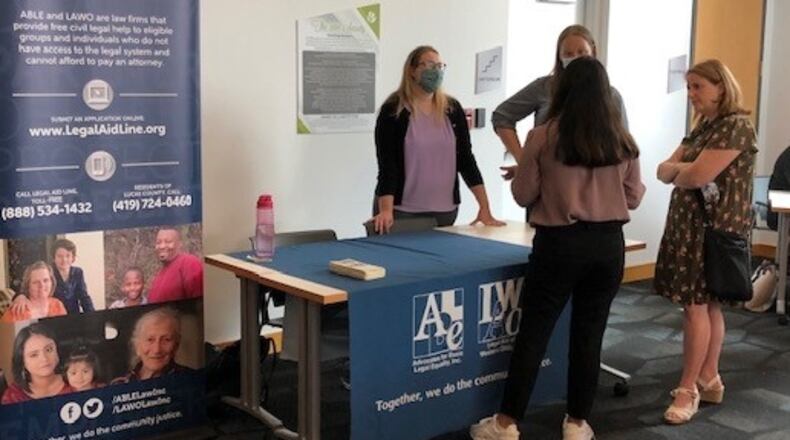“The majority of the people that came in that three-month period are stable and self-sufficient,” said Laura Jordan Roesch, chief executive officer with Catholic Social Services of the Miami Valley. Catholic Social Services is continuing to provide language and job training services to approximately a third of the Afghan refugees.
Since picking the refugees up from the airport, Catholic Social Services has been helping them navigate housing, job training and placement, language services, acculturation training, health care, and more.
“It’s the start of a brand new life in Dayton, so all of those things go into play very (early on),” Roesch said.
In addition to Catholic Social Services, the Welcome Dayton Committee has been helping refugees get connected with other services in the area, as well as with each other. Welcome Dayton has begun hosting events for the refugees to get connected, such as a recent one held at the Dayton Metro Library in collaboration with the library and Ohio TESOL (Teaching English to Speakers of Other Languages).
Other organizations that have also participated in welcome events for the local refugees include Dayton Public Schools, Catholic Social Services, Catholic Charities of Southwestern Ohio, Miami Valley Career Technology Center/Aspire, ABLE: Advocates for Basic Legal Equality, Wright State University Boonshoft School of Medicine, and Project Read.
Advocates for Basic Legal Equality Inc. has been working with the refugees on their immigration and residency status. Some of the refugees in the Dayton area would face a threat if they went back to Afghanistan due to them having been directly employed by the U.S. government for their work with the U.S. military, so they require a special immigrant visa. Other individuals are seeking asylum in the U.S. for fear of being persecuted for who they are if they were to go back to Afghanistan.
“We’ve just hired an attorney to serve this population,” said Kathleen Kersh, senior attorney and project director with ABLE. “We are trying to meet the needs of the Afghans here.”
For refugees with a professional labor background, Catholic Social Services, ABLE, and other partners have been working on getting them set up with similar jobs in the area.
“Most of them, if not all of them, have work authorization,” Kersh said, adding that getting immigrants placed in professional labor, such as engineering positions, can be challenging.
Roesch said the necessary credentials for some positions, like nursing and teaching, don’t always transfer over to a different country, so some of them may have to get new credentials and/or go back to school in order to qualify for a position in the U.S.
For the average person looking to help, Kersh said one way people can do that is be a “cultural mentor” to those individuals, helping them to navigate every day life and help them learn how to be successful in a given space.
“That is invaluable to people,” Kersh said, recommending individuals looking to help and volunteer to reach out to Catholic Social Services of the Miami Valley.
An ongoing challenge refugees face is housing, particularly when they are searching for affordable housing and may not have referrals or any credit history.
“It’s difficult housing market period,” said Susan Marticello, a local volunteer working with a family of Afghan refugees.
The family Marticello works with has been resettling well and continues to navigate every day life now, such as getting to doctor and dentist appointments. The children in the family have been enrolled in local schools, and two of the women are in college.
Overall, they’ve felt warm support from the local community.
“Tashakor or thank you! We want to thank the Dayton community for our warm welcome,” said Wajiha, 25, a college student who asked to only use her first name due to safety concerns. “Thank you for the support we received. We are excited for this opportunity to live and work in America. We are grateful for everything.”
Moh Fardeen Ahmadi is another local volunteer and who is also from Afghanistan. Ahmadi came to Dayton in September 2014 through a special immigration visa after working with the U.S. Army.
“Back then, there were no Afghan families here,” Ahmadi said. “I came here, and I love it.” He has also been helping the local refugees get settled in the area, such as helping one family go through driving lessons and get access to an affordable vehicle so his family wouldn’t have to take the bus.
Catholic Social Services has also helped refugees from other countries get resettled into Dayton. In 2021, new arrivals being resettled in Dayton came from Afghanistan (57%), the Democratic Republic of Congo (38%), Sudan (3%), Eritrea (1%), Iraq (1%), and Uganda (1%). In 2021, Catholic Social Services provided services to 589 individuals. Of those, 238 were new arrivals.
“Dayton is a very intentionally welcoming community,” Roesch said.
For anyone hesitant about refugees joining the community, Roesch encouraged them to learn about the refugees’ situation and about resettlement.
“I think I would encourage folks to learn about resettlement work in general,” Roesch said. While an immigrant is someone who chooses to move to a new country, refugees are forced to flee their country, sometimes for fear of persecution, war, ethnic or religious hatred, or more. “That status as a refugee comes from a place of real suffering and trauma,” Roesch said.
Roesch said Dayton has been welcoming to refugees, saying the Dayton area has a “culture of just being willing to get involved and being willing to help.”
“We really see the refugees as an asset,” Roesch said.
How to help
If you are a local employer or landlord interested in working with Catholic Social Services’ refugee resettlement program, call (937) 223-7217 and ask for the refugee resettlement department.
For more information, visit cssmv.org/services/refugees.
About the Author


